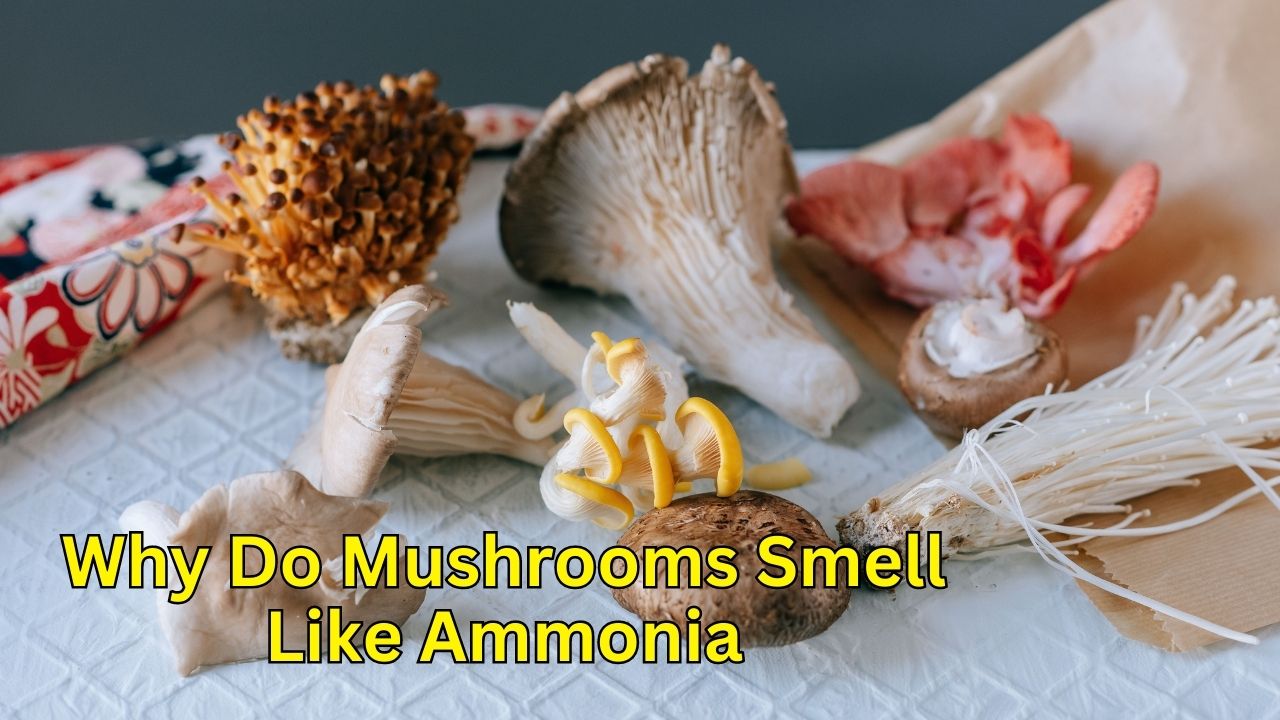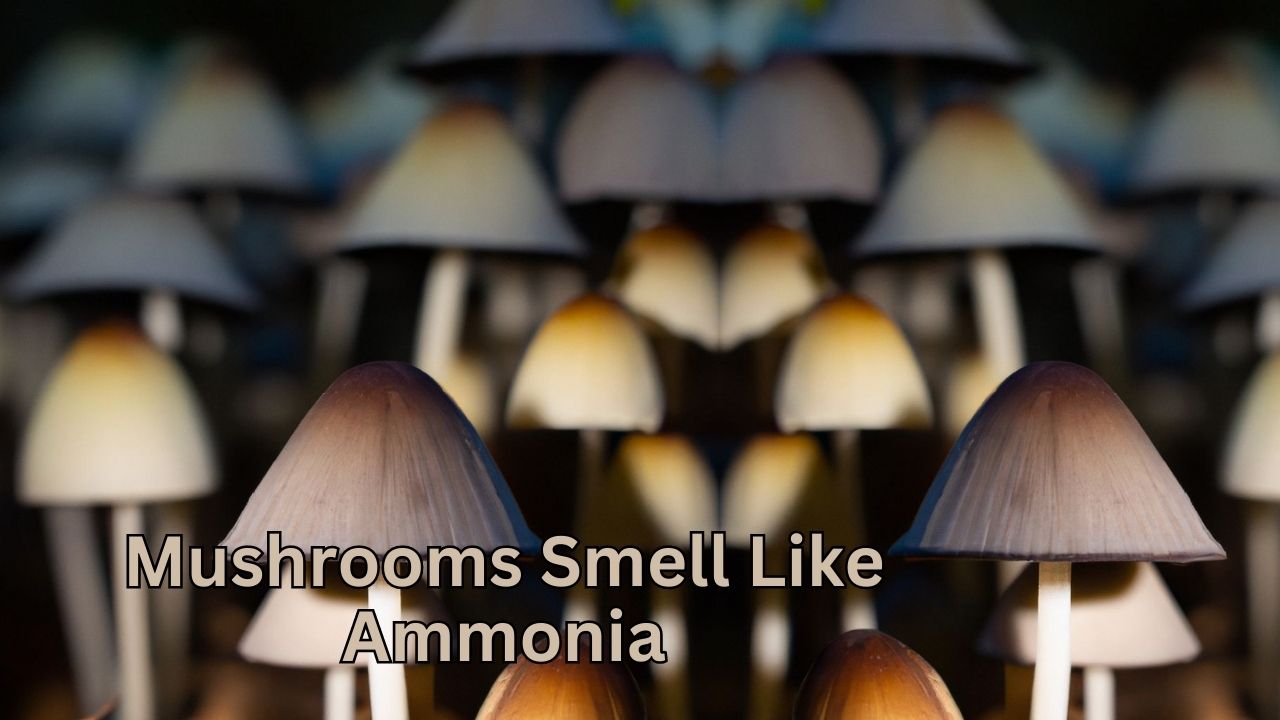Well, let’s move forward to read the introduction to the topic of mushrooms smell like ammonia.
Mushrooms – so mysterious and varied in shapes and sizes – have an interesting characteristic. They can give off an ammonia-like scent. Of course, mushrooms are known for their diverse fragrances, so this particular aroma is quite peculiar.
Let’s take a closer look at why mushrooms may smell like ammonia. A compound called agaricus bisporus, found in white button mushrooms, is one factor. When broken down, it releases a chemical reaction resulting in the release of ammonia vapors. Additionally, putrescine, made by bacteria or fungi during decomposition or fermentation, contributes to the smell.
Before handling or consuming mushrooms with an ammonia smell, it is important to take caution. Some species may naturally emit this odor, while others may be spoiled or contaminated. Knowing which mushrooms are safe is essential.
Let’s forward to know more about Mushrooms smell like Ammonia topic.
Table of Contents
Mushrooms Smell Like Ammonia
To understand the biology and chemistry behind the ammonia smell in mushrooms, delve into how certain compounds in mushrooms contribute to this distinct aroma. Explore the benefits of comprehending the science behind this phenomenon, as it sheds light on the intricacies of mushroom biology and the compounds responsible for their unique smell.
If you are still curious to know the topic Mushrooms smell like Ammonia, keep reading.
How certain compounds in mushrooms can contribute to the ammonia-like smell?
Mushrooms possess certain compounds that give off an ammonia-like smell. These volatile organic compounds (VOCs) are emitted during the fungi’s growth and development. Agaric acid is one of the major contributors to the odor, expelled when the mushroom is broken or damaged. Methionine and phenylacetic acid are other compounds thought to influence the smell.
Exploring the science behind the aroma can provide knowledge on mushroom growth and development. It could also lead to improved flavors, aromas, and nutrition in different mushroom varieties.
The complexities of mushrooms are truly remarkable. To unlock their secrets, we must venture into the mysterious realm of biology and chemistry. There we can discover ways to enhance flavor and health – a journey of discovery and innovation.
Potential reasons for mushrooms smelling like ammonia
To understand potential reasons for mushrooms smelling like ammonia, dive into environmental factors that can influence the smell. Exploring these distinct sub-sections offers insight into the underlying causes behind the peculiar odor emitted by mushrooms.
Environmental factors that can influence the smell of mushrooms
Environmental factors are key for the smell of mushrooms. They can cause an ammonia-like odor. Knowing these factors is vital for mushroom lovers and researchers.
- Humidity: Moisture levels affect the mushroom smell. High humidity encourages bacteria growth, leading to an ammonia-like smell.
- Temperature: Extreme temperatures can affect both the growth and smell. Rapid changes may cause microbial activity, leading to bad odors.
- Light: Light can change the chemical composition and smell. Direct sunlight and artificial light can cause odor changes.
- Air Flow: Proper airflow is essential to keep optimum growth conditions. Insufficient airflow can cause fungal growth and strong smells.
- Soil: The soil composition influences the aroma. Certain minerals and organic matter can influence the volatile compounds, resulting in specific smells.
- Microorganisms: Mushroom habitats have many microorganisms that interact with fungi. Some microorganisms produce ammonia, resulting in distinct smells.
Other details also matter when studying the smell of mushrooms. For instance, some species naturally emit an ammonia-like odor as a defense. Fungi near industrial sites or agricultural areas may absorb chemicals, resulting in strange aromas.
To address these environmental factors and reduce ammonia-like smells, here are some suggestions:
- Control Humidity Levels: Maintain humidity through ventilation or dehumidifiers to reduce bacteria and odors.
- Regulate Temperature: Provide a stable range to avoid temperature fluctuations that may cause bad smells.
- Limit Light: Shade or use diffused light to minimize chemical alterations and preserve natural aroma.
- Improve Air Flow: Ensure adequate airflow to prevent stagnant air, reducing the risk of bad odors.
- Manage Soil: Optimize soil by adding organic matter and minerals for a more pleasant smell.
- Prevent Contamination: Select growing locations away from sources of contamination to avoid absorption of unwanted odors.
By following these suggestions, mushroom lovers can potentially improve the smell while preserving its natural aroma, creating a great experience. Be careful: mushrooms smelling like ammonia may ruin your taste buds!
Impact of ammonia smell on the quality and edibility of mushrooms
Mushrooms are known for their special scent, but have you ever come across an ammonia smell? This article looks into the effect of that pungent odor on the taste and edibility of mushrooms.
The presence of an ammonia smell can hint at a problem. Ammonia is usually linked to spoilage and decomposition, which could mean the mushrooms have gone bad. This alters their flavor, texture, and quality.
What’s more, ammonia is a by-product of bacterial or fungal growth, which can lead to foodborne illnesses if eaten. So, it’s essential to be cautious when encountering mushrooms with such a strong smell.
Apart from the obvious signs of spoilage, there are other reasons this odor may be present. This includes improper storage, contamination during harvesting or processing, and some mushroom types having a natural ammonia scent. It’s vital for growers and suppliers to maintain cleanliness and quality control procedures to avoid this.
A farmer once forgot mushrooms in the fridge for too long and noticed a strong ammonia smell. He quickly threw them away and learned an important lesson on proper storage and timely consumption.

Frequently Asked Questions
Q1: Why do mushrooms sometimes smell like ammonia?
A: The ammonia smell in mushrooms is caused by a compound called agaric acid, which is a natural preservative found in many types of mushrooms. It is more noticeable in certain varieties, especially when they are not properly cooked or stored.
Q2: Are mushrooms that smell like ammonia safe to eat?
A: While mushrooms with an ammonia smell are generally safe to eat, it is recommended to use caution. The smell could be an indication that the mushrooms are not fresh or have been improperly stored. Always inspect mushrooms for any signs of spoilage before consuming.
Q3: Can mushrooms that smell like ammonia be cooked to get rid of the smell?
A: Yes, cooking mushrooms thoroughly can help reduce or eliminate the ammonia smell. The high heat breaks down the compounds responsible for the smell, resulting in a more pleasant aroma. However, if the mushrooms are spoiled or have a strong ammonia odor, it is best to discard them.
Q4: How should mushrooms be stored to avoid developing an ammonia smell?
A: To prevent mushrooms from developing an ammonia smell, store them properly. It is recommended to keep mushrooms refrigerated in a paper bag or a breathable container. Avoid storing them in sealed plastic bags or containers, as this can trap moisture and promote spoilage.
Q5: Are there any health risks associated with consuming mushrooms that smell like ammonia?
A: Generally, there are no significant health risks associated with consuming mushrooms that smell like ammonia. However, mushrooms that have a strong ammonia odor or show signs of mold or decay should not be eaten as they may cause stomach discomfort or other digestive issues. It is always advisable to use your discretion when consuming mushrooms with an unusual smell.
Q6: Can mushrooms smelling like ammonia be used in cooking despite the odor?
A: While mushrooms that smell like ammonia can be used in cooking, it is recommended to pay attention to the overall quality and freshness. The smell might affect the taste of the dish. So it is best to use mushrooms with a more pleasant aroma. If the odor is overpowering, it is advisable to choose fresher mushrooms for cooking.

